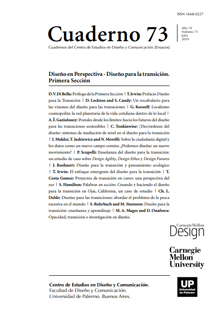On Digital Citizenship and Data as a New Commons: Can We Design a New Movement?
Résumé
Junto con la urgente necesidad de reinventar nuestra sociedad, una serie de cambios de paradigma ya están dando forma a las transiciones hacia una sociedad más participativa y digital. El trabajo actual hace un balance de la promesa de los datos abiertos (open data) como un nuevo recurso y elabora sobre el movimiento creador, que ha estimulado la capacidad de las personas para participar y ha proporcionado herramientas e infraestructuras para liberar la capacidad intrínseca de las personas para crear e innovar. Exploramos cómo los datos abiertos pueden ser nuevos comunes, discutimos cómo las hackatones pueden apoyar la ciudadanía digital y reflexionamos sobre el papel del Diseño para la Transición en la creación de ecosistemas en torno al recurso común y en la creación de capacidad.
Références
Bertot, J. C., Jaeger, P. T., & Grimes, J. M. (2010). Using ICTs to create a culture of transparency: E-government and social media as openness and anti-corruption tools for societies. Government Information Quarterly, 27(3), 264-271.
Botsman, R. (2013, November 21). The sharing economy lacks a shared definition. Retrieved from: http://www.fastcoexist.com/3022028/the-sharing-economy-lacks-a-shareddefinition#4
Dekkers, M., Polman, F., te Velde, R., & de Vries, M. (2006, June). Mepsir: Measuring European public sector information resources. Final report of study on exploitation of public sector information - benchmarking of EU framework conditions. Brussels: European Commission.
European Commission (2003). Communication of the re-use of public sector information - Review of Directive 2003/98/EC. Regulation.
Irwin, T., Kossoff, G., & Tonkinwise, C. (2015). Transition Design provocation. Design Philosophy Papers, 13(1), 3-11.
Kroes, N. (2011). Public data for all - opening up Europe’s public sector: 2011. Retrieved from http://blogs.ec.europa.eu/neelie-kroes/public-datafor-all-–-opening-up-europespublic-sector/
Linebaugh, P. (2009). Magna Carta manifesto: Liberties and commons for all. Berkeley, CA: University of California Press.
Lodato, T. & DiSalvo, C. (2016). Issue-oriented hackathons as material participation. New Media and Society, 18(4), 539-557.
Loorbach, D. (2014, October 31). To transition! Governance panarchy in the new transformation. Inaugural Address, Rotterdam: Erasmus University Rotterdam.
Manzini, E., & Rizzo, F. (2011). Small projects/large changes: Participatory design as an open participated process. CoDesign, 7(3-4), 199-215.
Max-Neef, M. A. (1991). Human scale development: conception, application and further reflections. New York: The Apex Press.
Morelli, N., Aguilar, M., Concilio, G., De Götzen, A., Mulder, I., Pedersen, J., & Torntoft, L. K. (2017). Framing design to support social innovation: The Open4Citizens Project. The Design Journal, 20(sup1), S3171-S3184. doi:10.1080/14606925.2017.1352823
Morelli, N., De Götzen, A., Mulder, I., Concilio, G., Pedersen, J., Jaskiewicz, T., & Aguilar, M. (in press). Open data as a new common. Empowering citizens to make meaningful use of a new resource. Proceedings of INSCI 2017, the 4th International Conference on Internet Science.
Mulder, I., & Loorbach, D. (in press). Rethinking design: A critical perspective to embrace societal challenges. Proceedings of Transition Design Symposium 2016.
Obama, B. (2009). Transparency and Open Government: The White House: 2009. Retrieved from http://www.whitehouse.gov/the_press_office/Transparency_and_Open_Government.
Vargo, S. L., & Lusch, R. F. (2008). Service-dominant logic: Continuing the evolution. Journal of the Academy of Marketing Science, 36, 1-10.
Los autores/as que publiquen en esta revista ceden los derechos de autor y de publicación a "Cuadernos del Centro de Estudios de Diseño y Comunicación", Aceptando el registro de su trabajo bajo una licencia de atribución de Creative Commons, que permite a terceros utilizar lo publicado siempre que de el crédito pertinente a los autores y a esta revista.


